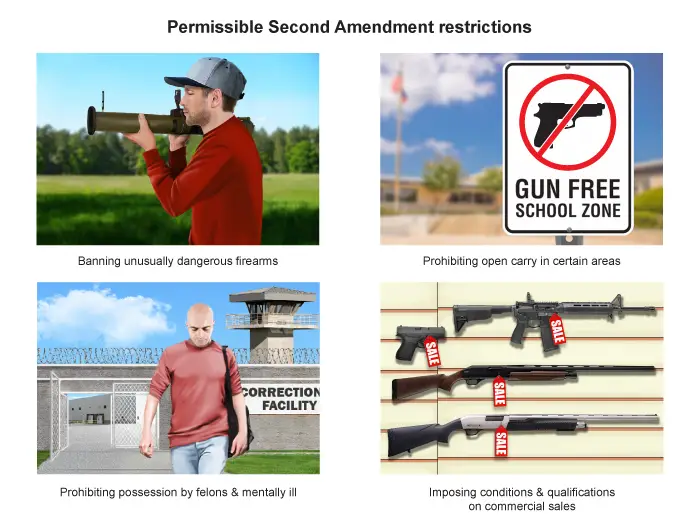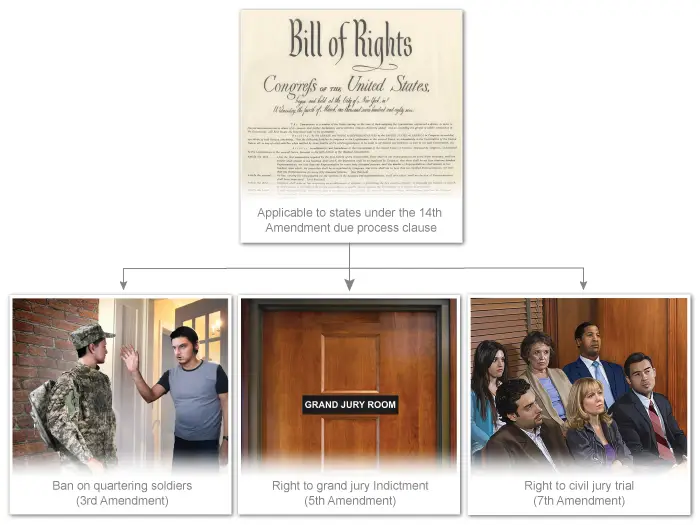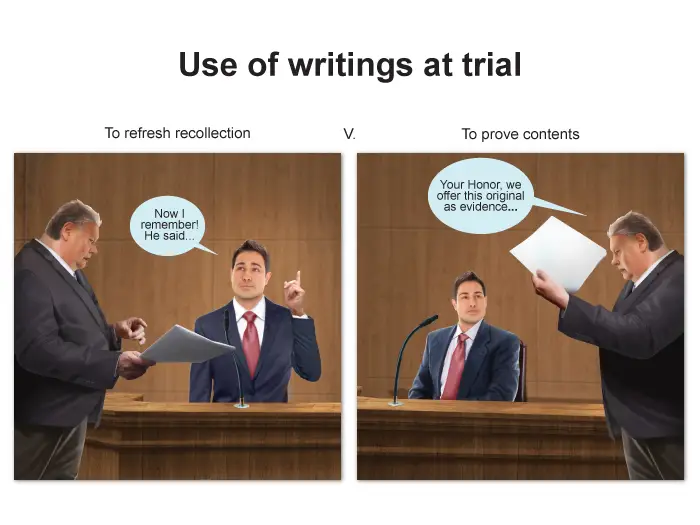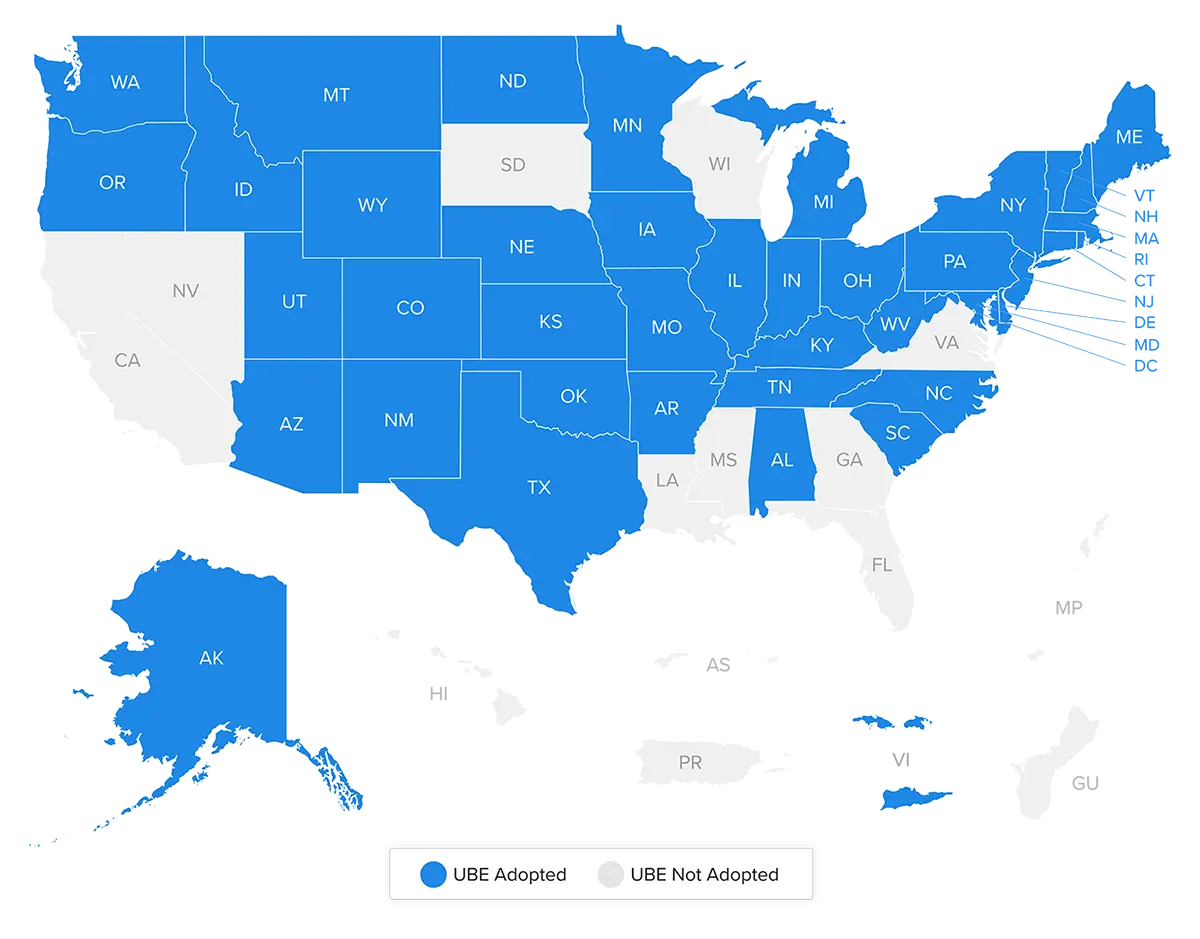Bar Examination by State
UBE & Non-UBE Jurisdictions
Candidates seeking admission to the bar and a license to practice law in the US must first pass the bar examination. Bar exams are administered by states or jurisdictions, often by agencies under the authority of state supreme courts. Almost all states use some of the exam components provided by the National Conference of Bar Examiners (NCBE®).
Forty-one jurisdictions have adopted the Uniform Bar Examination (UBE®), composed solely of NCBE-created components. However, in the thirteen states that have not adopted the UBE, the non-UBE jurisdictions have their uniquely curated bar exams to ensure that the state-licensed attorneys are well-seasoned in the state's intricate yet exhaustive legal system.
Please see the map below that indicates the UBE states in blue and the non-UBE states in gray.
UBE Adopted Jurisdictions
As discussed above, 41 jurisdictions have adopted the UBE as their standardized bar exam. The primary motive of the UBE is to ensure that there is uniformity of scoring among bar examinees and well defined criteria for eligibility to practice law in the states. So, as we broadly know, the US is divided into states, jurisdictions, and independent territories. So, each of these classifications has adopted the UBE to provide a uniform platform for law practitioners. Here is a list of US jurisdictions that have adopted the UBE.
| US Jurisdiction | Acquiring date |
|---|---|
| Alabama | July 2011 |
| Alaska | July 2014 |
| Arizona | July 2012 |
| Arkansas | February 2020 |
| Colorado | February 2012 |
| Connecticut | February 2017 |
| Idaho | February 2012 |
| Illinois | July 2019 |
| Indiana | July 2021 |
| Iowa | February 2016 |
| Kansas | February 2016 |
| Kentucky | February 2021 |
| Maine | July 2017 |
| Maryland | July 2019 |
| Massachusetts | July 2018 |
| Michigan | February 2023 (Upcoming) |
| Minnesota | February 2014 |
| Missouri | February 2011 |
| Montana | July 2013 |
| Nebraska | February 2013 |
| New Hampshire | February 2014 |
| New Jersey | February 2017 |
| New Mexico | February 2016 |
| New York | July 2016 |
| North Carolina | February 2019 |
| North Dakota | February 2011 |
| Ohio | February 2021 |
| Oklahoma | July 2021 |
| Oregon | July 2017 |
| Pennsylvania | July 2022 |
| Rhode Island | February 2019 |
| South Carolina | February 2017 |
| Tennessee | February 2019 |
| Texas | February 2021 |
| Utah | February 2013 |
| Vermont | July 2016 |
| Washington | July 2013 |
| West Virginia | July 2017 |
| Wyoming | July 2013 |
| District of Columbia | July 2016 |
| Virgin Islands | July 2017 |
Note: In every US jurisdiction except Wisconsin, all people seeking admission to the bar must pass a bar examination.
Non UBE Jurisdictions
Out of the 56 jurisdictions, 15 jurisdictions are functioning independent of the UBE. These jurisdictions have their own tailor-made bar exams for admission to the bar. We will later discuss what these states’ requirements are and what the different exams entail. Here’s a list of the non-UBE states:
| California | Hawaii | Virginia |
| Delaware | Louisiana | Wisconsin |
| Florida | Mississippi | Northern Mariana Islands* |
| Georgia | Nevada | Palau |
| Guam* | South Dakota | Puerto Rico* |
| *Territory |
Difference between UBE and Non-UBE Jurisdictions
It goes without saying that the UBE and Non-UBE jurisdictions have significant differences in their exam patterns, exam types, and requirements. So, let’s examine this in detail:
Exam types (MBE®/MEE®/MPT®/MPRE®/Drafted Exam)
The UBE consists of three exams, divided into two parts: the written part and the multiple choice part. Both parts have various intensive subjects and topics. In addition to the comprehensive bar exam, candidates in many states have to take an exam called the Multistate Professional Responsibility Exam (MPRE®) to fulfill additional ethics and character fitness requirements.
To learn more about the exam type, question format, and more, visit our page on Bar exam format and subjects. Speaking of the non-UBE exam types, please refer to the table below for the state-specific non-UBE exams:
| Exam Type | Jurisdiction |
|---|---|
| Drafted Exam | Puerto Rico |
| MPRE and Drafted Exam | Louisiana |
| MPRE and MBE | California Florida |
| MPRE,MBE, and Drafted Exam | Nevada Virginia |
| MPRE, MBE, and MPT | Delaware Georgia |
| MPRE, MBE, MEE, MPT, and Drafted Exam |
Northern Mariana Islands Guam Hawaii Mississippi South Dakota Palau |
In UBE jurisdictions, the bar exam is administered for two days, i.e., the last Tuesday and Wednesday of February and July. Similarly, in non-UBE jurisdictions, the bar exam is administered for two to two and a half days, depending on the number of exams that a candidate must give in a given jurisdiction.
The MPRE is not administered at the same time as the bar exam. It is usually conducted post the completion of the bar exam as a prerequisite for admission to the bar.

Local Components
Getting a license in most states requires an application, which typically involves paying fees, proving your character, and passing a skills test. However, some states may have additional requirements beyond passing the UBE to verify that you are familiar with the laws of that jurisdiction, referred to as the "Local Component."
In most states, you can now take these state-specific tests entirely online. The state in question determines whether this test must be taken before or after the bar exam. However, the local component must be completed before taking the bar exam in most states. Please see the table below to get a better understanding of the local component requirements.
| UBE Pre-Admission Local Component Requirements | Jurisdiction |
|---|---|
| No pre-admission component | Alaska, Arkansas, Colorado, Connecticut, District of Columbia, Idaho, Illinois, Indiana, Iowa, Kansas, Maine, Minnesota, Nebraska, New Hampshire, New Jersey, North Dakota, Oklahoma, Oregon, Pennsylvania, Rhode Island, Utah, Vermont, West Virginia, Wyoming |
| Pre-admission component | Alabama, Arizona, Kentucky, Maryland, Massachusetts, Michigan, Missouri, Montana, New Mexico, New York, North Carolina, Ohio, South Carolina, Tennessee, Texas, Virgin Islands, Washington |
Policies Set by UBE Jurisdictions
While all jurisdictions administering the UBE adopt similar standards for administration, grading, and scoring, each jurisdiction retains responsibility for its own. Jurisdictions may:
- Decide who may sit for the bar exam and who will be admitted to practice;
- Determine underlying educational requirements;
- Make all character and fitness decisions;
- Set their own policies regarding the number of times applicants may retake the bar examination;
- Make ADA decisions
To learn more about the NCBE policies, visit their official website.



Read More about Bar Exam
Here is everything you need to know about the updated Bar exam schedule and latest bar exam dates on your journey to becoming a licensed attorney in your state!
How much does the bar exam cost? What does it take to become your state’s licensed attorney? Learn about the arena of requirements and miscellaneous costs here!
